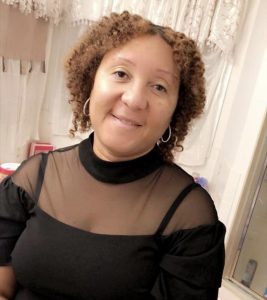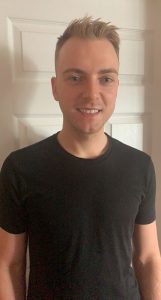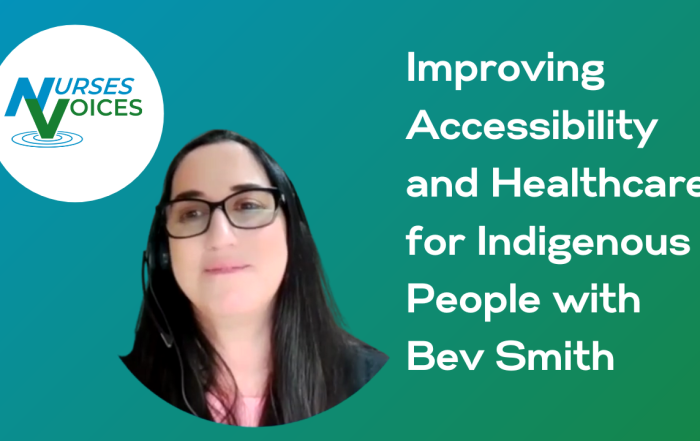[00:00:00]
Mary Wheeler: On this episode of Nurses’ Voices, we’ll be speaking with two nurses who work in homecare.
[00:00:06]
Announcer: This is Nurses’ Voices. Nurses’ Voices is supported by the Canadian Nurses Foundation and by the Canadian Nurses Association.
[00:00:16]
Mary Wheeler: Welcome to Nurses’ Voices. I’m Mary Wheeler
[00:00:19]
Gail Donner: and I’m Gail Donner
[00:00:20]
Mary Wheeler: Throughout COVID, much of the focus has been on hospitals and long-term care.
One sector that has received little attention is homecare and the healthcare professionals who provide care in the home. Michelle Williams. Is a registered nurse who works in community palliative care in Toronto for St. Elizabeth healthcare. And Paul Hickey is a licensed practical nurse who works in home supports as a director of nursing for Caregivers, Newfoundland and Labrador is first accredited homecare agency.
I’m wondering if we could begin Michelle with you to talk about what your role as a palliative care nurse was like before COVID and what has happened in the past year.
[00:01:06]
Michelle Williams: Before COVID it was in person, all in person visits, providing the in-home care, but, um, since COVID things have changed quite a bit, so we do a lot of virtual visits, so it’s about a 50/50% split in regards to home visits versus virtual visits for COVID.
So for those patients who are pretty stable, we do the virtual visits in the home, but if for any reason, the patient does need an in-person visit, that’ll be done as well.
[00:01:35]
Mary Wheeler: Okay. So then Paul, for you, what has, COVID been like?
[00:01:39]
Paul Hickey: It’s been virtual when possible but a lot of our services. It’s just not a lot of work that we can do anything virtual. So it’s just trying to be as safe as possible.
Um, on our home support side of things, personal protective equipment has been big. So ensuring that all of our workers have proper PPE when going into home. And we have clients in very rural areas. So it’s been a challenge. It was the challenge of trying to get the PPE to, to places and then teaching workers, how to properly don and doff their PPE.
And just ensure that they have a sufficient supply. We’ve been fortunate here in Newfoundland. We haven’t had as much of an outbreak as of the other areas of Canada, but we still have to be very careful
[00:02:25]
Gail Donner: So going into people’s homes, during a pandemic, families were saying don’t send anybody. And sometimes healthcare workers were saying: “I don’t want to travel from home to home, to home because I don’t know if it’s a safe environment for me and my family.”
Has that been any part of your experience, Michelle?
[00:02:47]
Michelle Williams: So we do our self screening, making sure that I’m okay. My family’s okay. Before I venture out to work. And then what we do is we do a calling into the patient’s home that do the screening as well. And we made sure we were on mask or face shield. And depending on what the patient’s status is, we do wear a mask and gown.
We always make sure we give a choice. Do you want a virtual or do you want to in-person visit?
[00:03:13]
Paul Hickey: It’s not much that we can really do virtually. Um, if I’m going into a home to train a home support worker there’s always a practical portion, uh, and a theory portion of the training, Theory, theory portion can be done virtually, it’s not a problem. With the practical portion: that is hands-on. Uh, we do our self screening as well. Um, if the client does not feel comfortable having, um, us come in to do some training with our workers, we’ll try to rely on family members or people that are already within their circle of care to provide the training until we’re able to, to go in and do our formal training.
In terms of scheduling alot of our workers have numerous clients. Have numerous clients probably within the same day. So limiting and trying to keep everyone circle care, small limiting the amount of workers per client, but then add a staffing shortage. We work with what we have and take it, uh, kind of on a case by case basis.
[00:04:14]
Mary Wheeler: Could you just talk to us a bit about what homecare is like in Newfoundland.
[00:04:20]
Paul Hickey: Sure. So homecare in Newfoundland is privatized, there is funding through the government and regional health authorities, the majority of business is privatized. So for example, if we have a client that is in hospital and they are discharged, but they need hope support, a request goes out before the client is discharged to the numerous homecare agencies in the province. Once it is selected and the client is discharged into our care. We build a care team for that client.
[00:04:51]
Mary Wheeler: Michelle, is it the same situation in palliative care?
[00:04:55]
Michelle Williams: So what happens when the patients, say for instance, referral is put through to home and community, used to be the LHIN, it goes over, it comes over to St. Eliz and then they match the nurse, the coordinator, matches the nurse with the patient and whatever needs they need.
Including the PSW service, whether or not, um, PSW so those things are requests from the hospital itself. So once that patient comes over to me, I get that referral. I do the re I do the review and I connect with a patient it’s always a matching of the nurse and the patient. What that patient care needs are.
[00:05:31]
Gail Donner: It takes a lot of independence and a little bit of courage to do any kind of home nursing. Paul. I know you went straight from your licensed practical nurse program to a community, to homecare. So I’d be curious about why you chose that. What made you think that was the place? That was a good fit.
[00:05:58]
Paul Hickey: My first instinct was I wasn’t too aware of what the job would entail rather than I went to bedside nursing and worked in an institution where I knew what I was getting into.
I wanted to challenge myself and go into the field that I didn’t know that much about. And another reason was my late grandmother. She had her own health challenges for the last couple years of her life. Lived at home. Um, didn’t want to go into an institution. That’s a big thing. I find here in Newfoundland.
A lot of people do not want to go into institutions. They want to stay living at home. But the resources and the education on how to properly care for themselves, isn’t in place. I just remember seeing her struggle with her own health issues. She didn’t have homecare workers. No, in our family was really trained in healthcare.
So I always, whenever I have a bad day, I always think about her and I just know that each homecare worker that I train is providing care to keep somebody living at their home longer. It makes them happy.
[00:07:09]
Gail Donner: I wonder Michelle, have you always done homecare?
[00:07:13]
Michelle Williams: No, I haven’t actually, when I started out nursing, I started working in a hospital. So what I started out with, I started as an RN, flipped over did my RPN. So I was working as an RPN in the hospital setting.
So I’ve done a few clinics back in a sub rehab. And then I, one of the things, when I was in my last, my doing my consolidation, I said to myself, you know what. I’m in the hospital. I see the patients, I see them today. Two, three days. I don’t see them. What happens to them? What is the process? And there was no follow through.
And I said to myself, you know what, I’m going to try community. So the opportunity came up and I went for community and I’ll be honest. I never looked back. I love the piece where I’m following the patient. I’m providing the care. That’s what gives me my satisfaction and that’s my passion. And then too, I looked at it was for my daughter as well, because I was going to school.
She was young and I wanted to be there. So it’s trying to balance that piece. And I found that balance.
[00:08:14]
Mary Wheeler: You’re very passionate about what you do and your reasons for doing it. What’s interesting is that there’s been a lot in the press and the media and profile around, uh, hospitals, those that are in the hospital around long-term care, but very little has been written or spoken about homecare.
[00:08:36]
Paul Hickey: In nursing school, where I mean my own experience, we’re conditioned to do bedside nursing.
I don’t know why that’s the focus. Um, I wish I did understand a bit more about it. Because, homecare here in Newfoundland more privatized. It’s not run by, by the government. Whereas the long-term care facilities are, maybe that’s the reason why. Um, but there is a push here in Newfoundland to keep our seniors lived in home for as long as possible.
So I am seeing improvement even the three short hair at the I’ve been in the field.
[00:09:11]
Gail Donner: If you were, you know, somebody asked you to come in to speak to a group of graduating nurses. And you really wanted to interest them in. Community, particularly in homecare, because there are lots of different kinds of community nursing.
What would, what would would your pitch be?
[00:09:33]
Michelle Williams: Passion is one. You have to be passionate about what you do and love what you do. The other piece of it: boundaries. There are a lot of people who want boundaries. I’m not a boundary person. So for me, if you’re one of those people, you can’t just get up and go and do your thing. Then that’s good for you.
But I would say, come on on this side too, all those nurses who want to do community because it’s building those connection, the rapport with the family. It’s a, it’s a team working together and we do, we do support each other as nurses in the community. So we always have somebody to lean on somebody to call on.
It could be a coordinator in a sense where a CPC, a clinical practice coach, somebody to call somebody like, um Paul, for instance, for training that kind of stuff. The education piece, the supporting of the home. So we do have that support, even though you are working independently, but you’re the one driving the bus.
In regards to the patient care and you’re talking to the patient and what they need. So I think, you know, it has to be a passion and a drive to do that. And it has to be a person who wants to go outside the box. Like Paul had mentioned for himself, right. Wanting to challenge himself.
[00:10:47]
Gail Donner: What would you say if I asked you to come to speak to a group of students Paul?
[00:10:52]
Paul Hickey: I wouldn’t say that they would need empathy if they want to really feel like they’re making a difference. You really get to feel like they’re making a difference in the community. And especially in home work, once these clients are discharged home, I mean, you might be one or one, a few nurses that they see until, God forbid, they are admitted back in hospital.
So you really are making a difference, even just the education part of it. Something as simple as diabetic education to a person who has diabetes for numerous years that is uncontrolled. And you follow that patient, you know, for several months, or for several years, and you see there they’ve improved. It definitely does give you that feeling of joy and makes you feel like you are making a difference.
If you’re, if you’re really, really are a nurse, because you’re trying to make a difference in the world, you really get to feel that.
[00:11:53]
Gail Donner: Thanks.
[00:11:53]
Michelle Williams: I agree.
[00:11:55]
Mary Wheeler: You were two amazing nurses who are really giving a lot of yourself to your patients, to your work. Uh, as I said, when I was trying to reach you, you’d be in the car hard to get ahold of because you were still working.
So what’s the balance. How do you, how do you build in some balance for yourself?
[00:12:14]
Paul Hickey: It’s challenging. I think I’m still trying to figure that part of it out, the more rewarding it is, you make, those connections with people, uh, You’re , you’re in their home. You almost feel like you’re part of thefamily. Um, so it’s, it’s really hard to shut that off.
Um, you know, once four-thirty or five o’clock in the evening hits, you know, you leave the office, go home. If the clients are still in your, in your mind. Um, I just try to focus. I just try to focus on the positive, you know, Yeah, focus on positive impact. I made during that day. Um, and if you know, something is bothering me, um, personally, I go to the gym, uh, I just try to go home and relax.
Uh, and then if something maybe doesn’t go right. Uh, the day before and that’ll be my priority for the next day and try to, that’s usually where I’ll start.
[00:13:14]
Michelle Williams: No, I, I agree with Paul because I’ve got a go-to person that I call her all the time. Again, for me, the satisfaction ensure that doing that follow through, making sure the patient’s needs are met.
And of course, when I get to my door, it’s a matter of updating my my files, making sure everything’s in place. Is there anything extra once I’m done that I’ll call a girlfriend of mine. And we’ll talk and we’ll debrief. So another piece that helps us as well in the community we have, or, um, our, our huddle that we have every week and still, it’s a group of us as palliative nurses and our supervisor.
We get to talk about, you know, the concerns, um, we do in St. Eliz is also have a self-help line that we can actually tap into to talk about any concerns. But for me, listening to music, um, coming home, having that shower, and sometimes just watching some YouTube.
[00:14:06]
Mary Wheeler: You talked about huddles, what is it like working for an organization that you’re really in your car all the time? The same as Paul you’re on the road. How do you come together and be part of an organization when there’s no… There are, there’s a head office like there’s bricks and mortar, but you’re not there in that spot.
[00:14:30]
Michelle Williams: One of the biggest things we have the Microsoft teams, so we get together and that’s where we all connect.
So we see each others faces. So that’s how we connect with, with each other, because before it wasn’t coming together at a specific meeting spot. A specific time we have coffee, whatever, but we can’t do that. So the Microsoft teams is where we meet in our cars.
[00:14:53]
Mary Wheeler: I didn’t even think of that. It is like another layer.
Not only are you in your car from home to home, but with COVID you can’t connect with your peers. So and what about you, Paul?
[00:15:04]
Paul Hickey: The office that I work out of primarily we are very close. Uh, so we have daily huddles, weekly meeting, first, in the morning, we’ll get together, discuss any issues, but we’ve kind of even pre COVID. We were set up to be able to connect virtually because there is, there are such long distances across the province.
Um, I have a nurse colleague in Corner Brook, which is, uh, if anyone’s familiar with Newfoundland, is the opposite side. Our smaller offices. We will have nurses. Um, we refer to as contract nurses, um, who will go out and do the training, um, for our home support workers. So it was a virtual teams on Microsoft teams has been huge lately.
Um, Zoom, you know, whatever platforms, uh, we’re, uh, platforms we can utilize.
[00:15:55]
Mary Wheeler: I wanted to bring a close to this session of Nurses’ Voices. What I’m so impressed with is that both of you come from two different perspectives. Michelle you’re right there with the patient. You are providing, uh, care either virtually or onsite.
And Paul, you play an amazing role of preparing a home support workers to also provide the care. In a system in a sector that couldn’t do without the both of you. So with that, I’d really like to thank you for taking the time to come on to Nurses’ Voices and to share your stories and to let other nurses in Canada know what’s going on in Toronto and St. John’s.
So that was an interesting episode, Gail, and I’m not even sure. That we got the whole picture of homecare. It was really just a taste of what nurses who work in homecare are faced with. They did bring a whole different perspective and even the roles that they had, again, they talked about the passion they have for this role and how they brought in this time, more of their, their own personal stories and how it played into what they do and why they do it.
[00:17:21]
Gail Donner: They like what they do. They’re comfortable in their own skins. Michelle, she’s a person who likes to be out there. She likes out of the box. She doesn’t want to be constrained by the rules and regulations and the physical environment. And I think the same in a way for Paul, he was looking for something that would let him explore his whole self. There just was like a calmness about it. And I think we’ve seen that in other nurses. And, you know, if I were inviting them to let’s say, speak to a class of students, I think you’d feel confident that you can have a really good career. The other thing is I just loved it when Paul says, well, I would tell them if you really want to make a difference, you come to homecare.
You might be, have years of a relationship with a family or a patient or a client. So if you want to make a difference, come to homecare. There is something different, about that kind of work. I mean, even going into a stranger’s home, you know, when, you’re nursing in the hospital, that’s your territory. And the patient is the guest.
When you’re in the client’s home, you might be doing the same thing you do in the hospital, but that’s not your place. You’re the guests, that’s their territory. So just listening to them. Talk about caring for people was wonderful. I very much enjoyed it.
[00:19:01]
Mary Wheeler: Yup.
I hope you’ve enjoyed this episode of nurses’ voices.
You can view and listen to Nurses’ Voices on a variety of platforms, including YouTube and Apple podcasts. And remember if you have a story to tell us or want to give us some feedback, please connect with us through nursesvoices.ca
[00:19:22]
Announcer: Nurses’ Voices is created by donnerwheeler. It is supported by the Canadian Nurses Foundation and the Canadian Nurses Association.
Nurses’ Voices is produced by Cecktor Limited.













